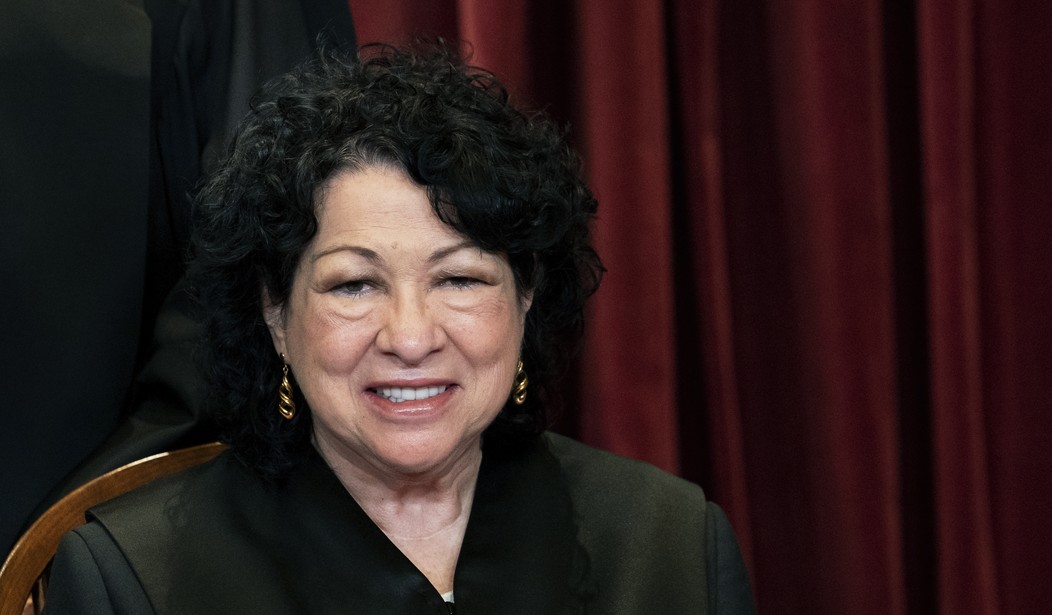The Supreme Court is in the midst of issuing a flurry of rulings as they finish up the court's current session. One of them that was handed down yesterday is raising eyebrows for unusual reasons. In the case of Department of State v. Munoz, Sandra Munoz was challenging the denial of her husband's ability to enter the United States from El Salvador to come live with her. Immigration officials at the U.S. Consulate in El Salvador had refused entry to Luis Asencio-Cordero because of tattoos he had which they believed indicated that he was a member of one of El Salvador's criminal gangs. The court ruled 6-3 in favor of the State Department, saying that citizens have no constitutional right to be able to reside with their spouse within the United States if other legal impediments prevent that from happening. The three liberal justices dissented, with Associate Justice Sonia Sotomayor penning a somewhat bizarre dissent, claiming that the majority's ruling was not only "chipping away at constitutional protections for married couples," but could also threaten the legality of gay marriage. (New Republic)
In a ruling delivered Friday, the Supreme Court decided 6–3 that U.S. citizens have no constitutional interest in their noncitizen spouses being able to enter the United States—despite the fact that a married person has an inherent interest in their spouse being able to live in the same country as they do. Supreme Court Justice Sonia Sotomayor warned the ruling is an obvious sign the court will seek to overturn protections for marriage equality next.
Sotomayor issued a dire warning in her dissent, accusing the conservative supermajority of chipping away at constitutional protections for married couples and saying they’re making “the same fatal error” as they did in Dobbs v. Jackson, the 2022 Supreme Court ruling that overturned federal abortion protections.
“The majority, ignoring these precedents, makes the same fatal error it made in Dobbs: requiring too ‘careful [a] description of the asserted fundamental liberty interest,’” Sotomayor wrote.
Attempting to pick apart Sotomayor's dissent is rather complicated because there are several factors involved. One of these is the fact that the plaintiff's attorneys brought in an expert witness who testified that Asencio-Cordero's tattoos were not actually gang-related. (How one becomes an expert in that specific field wasn't made clear.) It is common knowledge that Latin American gang members frequently sport large numbers of tattoos, but perhaps that wasn't the case with him. In any event, that question seems immaterial to the underlying constitutional issue.
The key argument comes with Sotomayor's assertion that a constitutional right to cohabitate with a spouse exists. No one was denying Sandra Munoz's right to marry her husband. Immigration officials were denying him entry into the country. This was strictly a question of immigration law, not a question of laws involving marriage. Munoz was free to travel and live with her spouse in El Salvador if they were willing to accept her, something that Sotomayor noted in her dissent. But she claimed that Munoz would be at risk of being denied entry, another point that seems irrelevant in this debate.
If a right to cohabitate with a spouse existed, we would never be able to imprison anyone who is married. A marriage license could literally be brandished as a license to kill. The U.S. Consulate in El Salvador denied Munoz's husband a visa. This was done based on a provision in U.S. immigration law that allows such a denial if the Consulate "knows or has reasonable ground to believe” that a person is trying to enter the U.S. “to engage solely, principally, or incidentally in” unlawful activity. Finding that Asencio-Cordero was likely a gang member (whether that turned out to be accurate or not) seems as if it would clearly fall into this category. And none of this addresses the question of how this ruling could be applied to a hypothetical challenge to the rights of gay and lesbian couples to marry.
This ruling in Department of State v. Munoz comes at an important moment. Thanks to Joe Biden's disastrous open border policies, immigration officials are already overwhelmed and being given conflicting and seemingly illegal guidelines to follow by the White House. The courts are flooded with challenges brought by people who didn't manage to be caught and released into the interior of the country to take advantage of all of the free benefits being offered under the Biden administration. The right of refusal of entry to those we do somehow manage to intercept is critical. If Sotomayor and her two liberal colleagues had gotten their way, it would have one more wrinkle in the system making it even harder to close our border again. The court's conservative majority should be applauded for this sensible ruling.








Join the conversation as a VIP Member